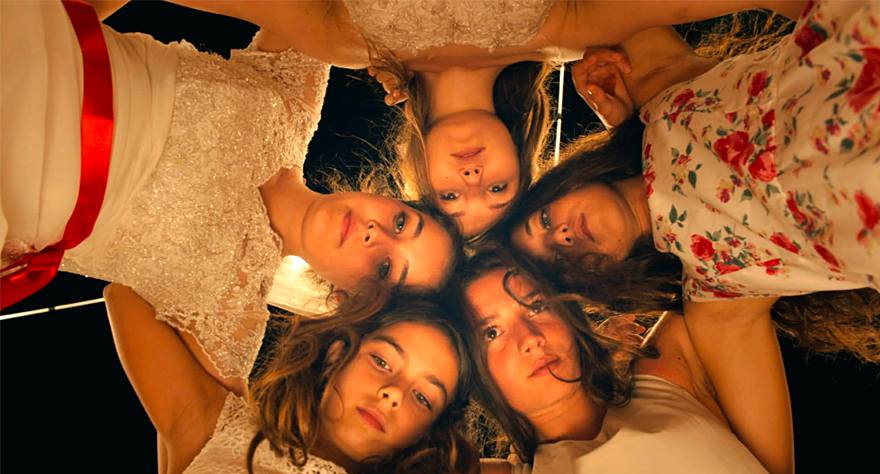
An exhilarating must-watch around the feminine experience of five fierce Turkish girls.


An exhilarating must-watch around the feminine experience of five fierce Turkish girls.

Writer/director Deniz Gamze Ergüven has explained that her film Mustang—which was filmed in Turkey, spoken in Turkish, and labeled a French film because of the country of origin of its director—doesn’t have any alternate foreign language title. Apparently “mustang” is mostly a universal term. In Ergüven’s film, the word couldn’t have been more aptly chosen. If a mustang is an unbroken and unbridled creature, the five young women featured in this film embody exactly that. What starts as a dreamy and playful look at rambunctious and headstrong girls in their youthful prime melds subtly and meaningfully into a powerful view into the barbarously different female experience for women in different parts of our world.
In a small Turkish coastal town, five sisters start their summer break from school by exerting their tenacity and free will, splashing through the beach as they walk home and playing games of chicken with teenaged boys from their school. The youngest of them, Lale (Gunes Sensoy), exhibits the most spunk, determined to match her elder sisters—Nur (Doga Zeynep Doguslu), Ece (Elit Iscan), Selma (Tugba Sunguroglu), and Sonay (Ilayda Akdogan)—in confidence and self-expression. When they arrive home from their last school day, their grandmother (Nihal Koldas) awaits ready to lash out at the girls for their improper behavior, word of which has traveled through the small town amongst local gossips. The girls react strongly, protecting one another from beatings and rushing to tell-off the righteous woman who ratted on them.
Their total dismissal of their grandmother’s reaction is energetically humorous and does well to quickly showcase the tight-knit nature of these five sisters. But this seemingly harmless incident kickstarts a reactionary response from their family—both their grandma and uncle look after the girls who were orphaned years before. It begins tediously enough with the girls being restricted from leaving the house and forced to partake in traditional lessons from their grandmother and other local women. The girls learn to cook and sew and are forced to start wearing modest long brown dresses. They make do, running around the house in bras and underwear, playing games with one another and sneaking out down their drain pipe. The girls are annoyed with the new regime of no computers or phones, but continue to speak their minds and exert their individuality, expressing themselves in rebellions both big and small.
A trip to town one day makes their grandmother’s intentions a bit clearer to the girls. She asks them to walk through the town center displaying the girls to the families and men also there. Clearly the lessons and increased restrictions are measures meant to make the girls more marriable. The two eldest girls are the first to undergo the traditional arrangements, a brief meeting with the family of an eligible boy and a quick betrothal. Sonay manages to bully her grandmother into arranging a marriage with a boy she has already been sneaking around with and fallen for, but her sister is forced to accept the arrangements made for her.
The push from adolescence to adulthood in the film is less coming of age than innocence taken, but Ergüven—who co-wrote the script with Alice Winocour—doesn’t allow the film to wander too far into tragic victimization, instead providing one of the most tenacious films on female empowerment to come out in recent years. As the girls are ripped apart, their connected strength waning, it’s Lale, the youngest, who refuses to accept the fate laid out for her by her elders. And just like that, Mustang moves from being a disturbing cultural insight to an adrenaline pumping getaway.
Despite its rural setting and the rather alien practices performed in the film, Mustang is distinctly contemporary and salient. The judgment on these girls’ feminity and the perceived threat of their sexuality and the urgency to curb it is so incredibly universal. But even more relatable (to a degree) as their oppression is, what is most piercing about Ergüven’s film is the obvious and fierce response of these siblings. Oppression occurs everywhere, but outrage and advocacy do as well. This fight belongs to many in the world, from rural Turkey to New York City, and the film is the best kind of sticking agent, uniting anyone who feels the injustice.
The young actresses of Mustang are critical to its flawlessness, right down to their identically long flowing—and distinctly unbridled-horse-esque—hair. Their chemistry is altogether magical and almost documentary feeling in its sincerity. Ergüven’s light touch allows the film’s inexperienced stars to shine. The film’s pacing is perfect, with quiet moments accenting the isolation of the girls’ house or the many ways in which they bond with one another in their imprisonment. Warren Ellis’s off-kilter score fits the mood, never letting it get too sappy or alternately too rambunctious.
Mustang is France’s entry into this year’s Academy Awards and for sheer surefootedness from its first time director alone, it is sure to be the sort of film that gets attention. And rightly so. In highlighting both the unfortunate extreme of female persecution and also the most extreme courage and perseverance in the face of such inequality, and by making its hero a very young and determined girl, Mustang manages to shed light on the wrongs of today while instilling hope in the tenacity of the future.
Everything about this film is brave, but more significant is the way it imbues bravery on those who watch.